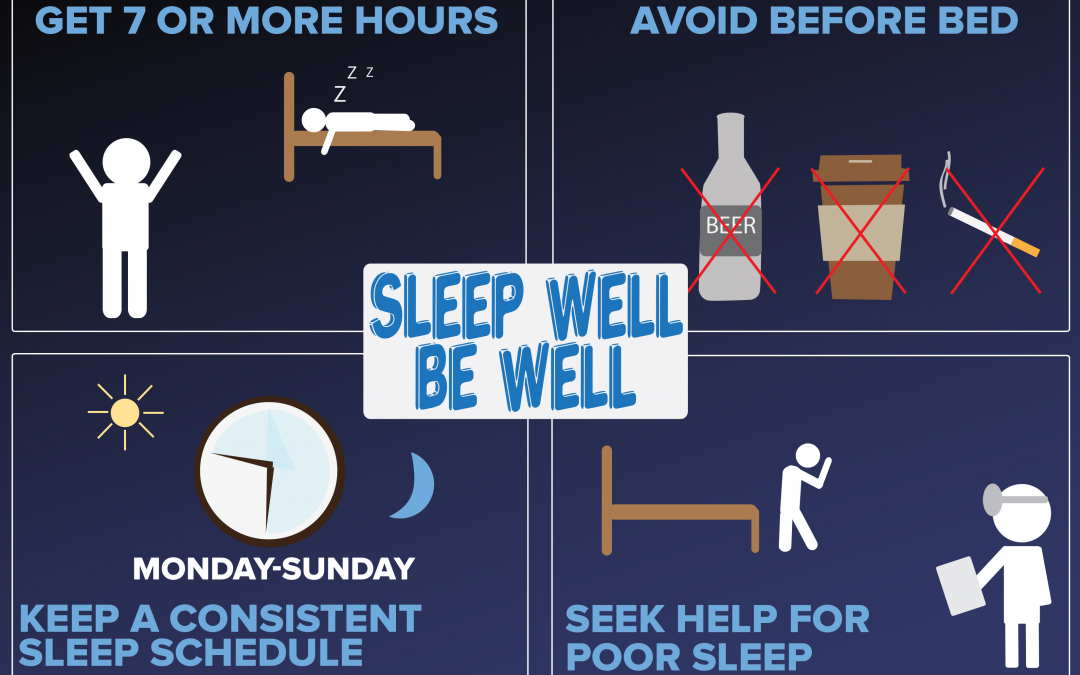By Matthew Haugen, MD, Resident Physician
Proper sleep is vital to a number of body functions. During sleep, memories are formed and hormones that help repair and regenerate your body are released. Hormones relating to stress and hunger are also regulated by sleep. The amount of sleep a person needs varies, but typically an adult will need around 7-9 hours for ideal daytime functioning and health.
Difficulty sleeping (falling asleep, waking up from sleep, etc.) is a common concern – some surveys have shown that up to 60% of adults report difficulty sleeping a few or more nights per week. The loss of even as little as one hour of sleep has been shown to decrease reaction time, impair concentration, and worsen decision making capabilities. Chronic sleep deprivation has been associated with mood disturbances, depressed immune system function resulting in increased risk of infections, increased risk of high blood pressure, heart disease, diabetes, mood disorders, and memory loss.
How do you know if you’re getting enough sleep? A simple rule of thumb is that you should feel well rested when you wake up in the morning. Some common signs that you need to reevaluate your sleep routine include needing longer than 30 minutes to fall asleep, feeling tired when you wake up in the morning, or feeling drowsy during the day and/or relying on caffeinated beverages to function. Other common concerns we hear involving sleep include loud snoring, waking up gasping for breath, or a partner noticing that you stop breathing during sleep (all of which should prompt a visit to your doctor).
Trouble sleeping is often related to a person’s bedtime routine. Here are some tips to help optimize your bedtime routine:
• Stick to a schedule. Going to bed and waking up at the same time every day helps your body to get into a rhythm.
• Regular exercise is helpful for more restful sleep, but timing is important – exercising within 4 hours of bedtime can hurt your ability to fall asleep.
• Avoid napping. If you must, short naps (around 20 minutes) can improve daytime alertness, while longer naps (generally over 30 minutes) can cause a period of drowsiness on awakening.
It’s best to not nap after 3 pm.
• Caffeine and nicotine are stimulants. Avoid caffeine after noon. Quitting or even cutting back on smoking can greatly improve the quality of your sleep.
• Similarly, avoid drinking alcohol 4-6 hours before bed. It may make you feel sleepy initially, but it often leads to waking up in the middle of the night as the effects wear off. This interrupts normal sleep cycles, leading to less restful and restorative sleep.
• Go to bed when you’re tired. If you’re lying in bed and can’t fall asleep, get up and leave the room. Do something quiet (e.g. reading or a puzzle) and go back to bed when you start to feel tired.
• Your bedroom should only be for sleep and sex. No TVs, iPads, work, etc.
• Limit screen time prior to bed. Devices like your phone, iPad, and TV emit blue light. Blue light mimics daylight and can confuse your body by preventing the release of chemicals that help you feel tired and altering your body’s natural sleep cycles. You should stop using these devices at least 30 minutes, and preferably one hour, prior to bedtime. If you absolutely must use them, make sure to dim the backlighting or use a filter to modify the amount of blue light you’ll receive.
You can also find additional information from the American Academy of Sleep Medicine at http://sleepeducation.org/
If you’ve tried the above and are still having trouble sleeping, it might be time to visit your doctor. Again, this is a common concern and given the wide-ranging impact sleep disturbances can have on your life, we’d love to help you get the best night’s sleep possible.

